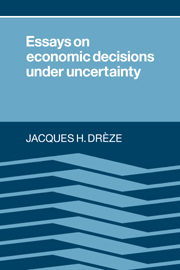Book contents
- Frontmatter
- Contents
- Acknowledgements
- Foreword
- I Decision-making under uncertainty: general theory
- II Markets and prices
- III Consumer decisions
- 8 State-dependent utility, the demand for insurance and the value of safety
- 9 Consumption decisions under uncertainty
- 10 Earnings, assets and savings: a model of interdependent choice
- IV Producer decisions
- V Theory of the firm
- IV Human capital and labour contracts
- VII Public decisions
- Index
9 - Consumption decisions under uncertainty
Published online by Cambridge University Press: 01 October 2009
- Frontmatter
- Contents
- Acknowledgements
- Foreword
- I Decision-making under uncertainty: general theory
- II Markets and prices
- III Consumer decisions
- 8 State-dependent utility, the demand for insurance and the value of safety
- 9 Consumption decisions under uncertainty
- 10 Earnings, assets and savings: a model of interdependent choice
- IV Producer decisions
- V Theory of the firm
- IV Human capital and labour contracts
- VII Public decisions
- Index
Summary
This chapter deals with three issues related to consumption decisions under uncertainty, namely, (i) the determinants of risk aversion for future consumption; (ii) the impact of uncertainty about future resources on current consumption and (iii) the separability of consumption decisions and portfolio choices. These issues are discussed in the context of a simple model introduced, together with our assumptions, in Section 1. The first issue is motivated and treated in Section 2, the conclusions of which are summarised in proposition 2.5. The other two issues are treated in Section 3 under the assumption that there exist perfect markets for risks, and in Section 4 under the converse assumption.
Some technical results needed in the text are collected in Appendices A, B and C; a simple graphical illustration of our major result, theorem 3.3, is given in Appendix D.
The model and the assumptions
Model
Following Fisher (1930), we study the problem faced by a consumer who must allocate his total wealth y between a flow of current (or ‘initial’) consumption c1 and a residual stock (y – c1) out of which future consumption c2 (including bequests) will be financed. We restrict our attention to the aggregate values of present and future consumption, or equivalently to a single-commodity, two-period world.
We conceive of the consumer's wealth y as being the sum of two terms:
The (net) market value of his assets, plus his labour income during the initial period, to be denoted altogether by y1.
The present value of his future labour income, plus additional receipts from sources other than his current assets.
- Type
- Chapter
- Information
- Essays on Economic Decisions under Uncertainty , pp. 182 - 212Publisher: Cambridge University PressPrint publication year: 1987
- 1
- Cited by

